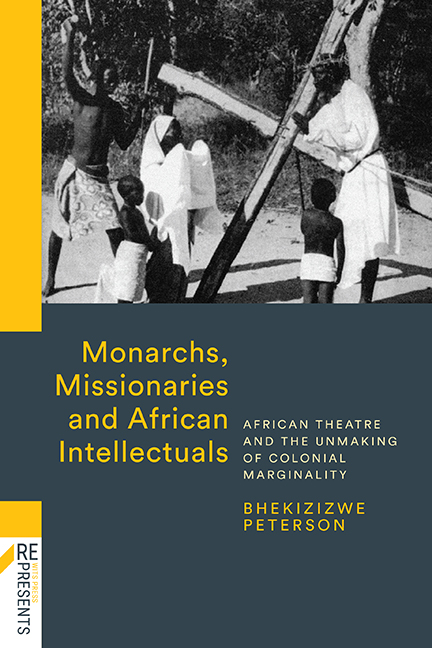 Monarchs, Missionaries and African Intellectuals
Monarchs, Missionaries and African Intellectuals Book contents
- Frontmatter
- Dedication
- Contents
- Preface and Acknowledgements
- Note on Zulu Orthography
- Introduction: Staging the (Alien)nation: African Theatre and the Colonial Experience
- 1 ‘All Work and No Play Makes Civilisation Unattractive to the Masses’: Theatre and Mission Education at Mariannhill
- 2 ‘I Will Open My Mouth in Parables’:Accounting for the Crevices in Redemption
- 3 Parallel Time, Parallel Signs, Discordant Interpretations
- 4 B.W. Vilakazi and the Poetics of the Mental War Zone
- 5 The Bantu Men’s Social Centre: Meeting the Devil on his own Ground
- 6 The Bantu Dramatic Society According to a Gossip Columnist
- 7 Contesting ‘The Bantu Imagination’: The British Drama League & The New Africans
- 8 H.I.E. Dhlomo: Measuring the Distance Between Armageddon and Revolution
- 9 ‘The Black Bulls’: Assembling the Broken Gourds
- 10 Hegemony and Identity: What a Difference ‘Play’ Makes
- Notes
- Bibliography
- Index
3 - Parallel Time, Parallel Signs, Discordant Interpretations
Published online by Cambridge University Press: 12 October 2021
- Frontmatter
- Dedication
- Contents
- Preface and Acknowledgements
- Note on Zulu Orthography
- Introduction: Staging the (Alien)nation: African Theatre and the Colonial Experience
- 1 ‘All Work and No Play Makes Civilisation Unattractive to the Masses’: Theatre and Mission Education at Mariannhill
- 2 ‘I Will Open My Mouth in Parables’:Accounting for the Crevices in Redemption
- 3 Parallel Time, Parallel Signs, Discordant Interpretations
- 4 B.W. Vilakazi and the Poetics of the Mental War Zone
- 5 The Bantu Men’s Social Centre: Meeting the Devil on his own Ground
- 6 The Bantu Dramatic Society According to a Gossip Columnist
- 7 Contesting ‘The Bantu Imagination’: The British Drama League & The New Africans
- 8 H.I.E. Dhlomo: Measuring the Distance Between Armageddon and Revolution
- 9 ‘The Black Bulls’: Assembling the Broken Gourds
- 10 Hegemony and Identity: What a Difference ‘Play’ Makes
- Notes
- Bibliography
- Index
Summary
The Mariannhill plays have been discussed in relation to their expression of the mission's religious and social aims. In this chapter I will register, as far as is possible in the absence of the accounts of participants, African responses to evangelism and performance at Mariannhill. Attention has already been drawn to the dialogism between white preachers and the black populace in Joseph in Egypt, Job and Indodana Elahlekileyo. All three plays, even at their most authoritative moments, carry definite traces of the concerns, voices and aesthetics of Africans. The dialogism encountered in the thematic focuses of the dramas can be extended by delineating two further areas where there is evidence of contestatory rejoinders from Africans. The first of these concerns a series of public dissensions over the politics of language that rocked Mariannhill in 1912 and 1919 when the mission released catechisms in Zulu. The second disagreement involves differing approaches to drama and its generic boundaries. The multifarious issues and dilemmas that informed the conflicts over language and drama are teased out firstly, by appreciating the linguistic fluency and agency of the African elite in both English and Zulu and the consternation that such panache evoked in missionary circles.
The kholwa were viewed by Zulu traditionalists and some missionaries as people who simply crossed over to the other side where they exhibited a profound sense of paralysis, if not outright schizophrenia. This view is partially supported by the cautious and moderate demeanour that characterised the politics of educated Africans. As a result of the kholwa's accommodative hopes and faith in liberal democracy, Natal leaders such as Dube and Pixley ka Isaka Seme tended to assume a deferential relationship to mission and colonial authority. It was precisely by occupying the intermediary ground, a diffuse, marginal space, that the kholwa were compelled to forge profoundly new forms of African identity in response to modernity. Fanon makes the point that the colonised, after encountering the full weight of the colonial culture, cannot return to any authentic and unspoilt past; instead they take up the challenge and occupy ‘a zone of occult instability’.
The cultural epistemologies of Africans, captured in the memories and orature emanating from the past could not be wiped out with the stroke of a pen as Dube pronounced.
- Type
- Chapter
- Information
- Monarchs, Missionaries and African IntellectualsAfrican Theatre and the Unmaking of Colonial Marginality, pp. 67 - 90Publisher: Wits University PressPrint publication year: 2021


